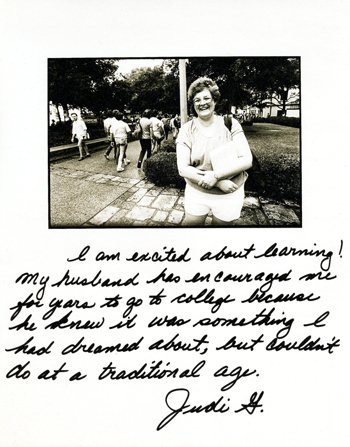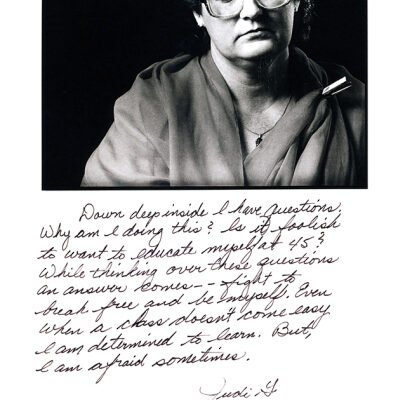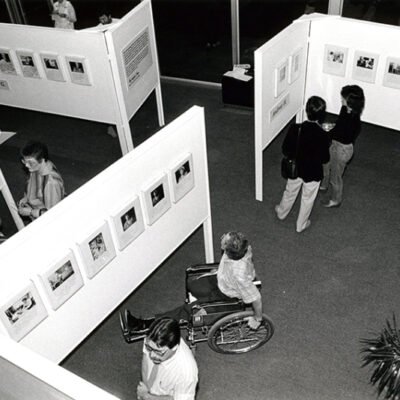

Back to School
The Back to School project examined what remains a contemporary social issue–the return of adults to college. Sixty-one photo-texts, a play, and 2 public forums were a part of this show. It was designed to provoke discussion about the process of self-definition and the unique needs of mature learners.
An Exhibit
61 photo texts
October 17 thru November 8, 1986
Two Forums
Words & Pictures: Process & Product, October 18, 1986 at 2 p.m.
Opportunities & Constraints On Mid-Life Women Students, October 19, 1986, at 2 p.m.
A Play
Directed by Sidney Brammer, the play focused on the real-life experiences of mid-life women who return to college. Performances ran October 24-26. Performances were followed by public discussions in Mary Moody Northen Theatre at St. Edward’s University
Below is an introduction, including some sample questions, written for the first forum of the series.
WORDS AND PICTURES: PROCESS AND PRODUCT
Panelists
Dennis C. Darling, photojournalist
Alan Pogue, photojournalist
Michelle Campbell, documentary photographer
Roy C. Flukinger, photo historian
Danny Schweers, artist
Robert Fernea, cultural anthropologist
Joli Jensen, communication researcher
Moderator: Joli Jensen
British sociologist Ann Oakley has written the following about the interview process as a
research methodology:
“Interviewing is rather like marriage: everybody knows what it is, an awful lot of people do lt, and yet behind each closed front door there is a world of secrets. Despite the fact that much of modern sociology could justifiably be called ‘the science of the interview,’ very few sociologists who employ interview data actually bother to describe in detail the process of interviewing itself. The conventions of research reporting require them to offer such information as how many interviews were done and how many were not done; the length of time the interviews lasted; whether the questions were asked following some standardized format or not; and how the information was recorded. Some lssues on whlch research reports do not usually comment are: social/personal characteristics of those doing the interviewing; interviewee’s feelings about being interviewed and about the interview; interviewers’ feelings about interviewees; and the quality of the interviewer-interviewee interaction; hospitality offered by interviewees to interviewers; attempts by interviewees to use interviewers as sources of information; and the extension of interviewer-interviewee encounters into more broadly based social relationships.” (“Interviewing women: A contradiction in terms,” 1985.)
The forum on October 18 is meant to be a public discussion of the human experiences and concerns of producers, critics and consumers of “documentary” or nonfiction word/picture stories. Panelists have been asked to consider some of the following questions with regard to the ways they work and the kinds of products they create. You may have others you wish to have them discuss. Please feel free to ask them.
1. What are the most important stories you’ve collected?
2. How do you select your subjects?
3. Why did you choose them?
4. How do you “get in” with the people you work with?
5. Why do they let you do what you do? What is it about you? About them?
6. Do you see yourself as a witness or a participant in your work?
7. Who is the “expert” in the storytelling process? The subject? You? An editor/publisher? How do you select what is significant in your data?
8. What kind of relationship are you looking for with your subjects? With your audience?
9. How much does a subject’s response to your work influence the final product? How much does an editor’s? How do these inputs compare?
10. What is your final objective? To entertain? To inform? To persuade?
11. What does social research have to do with social reform?
12. What’s the bottom line for you? Personal authority? Political action? Aesthetics? Else?








